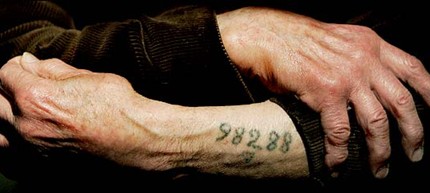When the death camps and ghettos of Europe were liberated at the end of World War II, a psychologist from Chicago visited former prisoners and recorded their interviews. Unheard for decades, a long-missing reel of songs has been rediscovered, offering a haunting document of the horrors of the Holocaust. David C. Barnett of PBS member station WVIZ reports.
JUDY WOODRUFF: When the death camps and ghettos of Europe were liberated at the end of World War II, a psychologist from Chicago visited former prisoners and recorded dozens of interviews.
David Boder’s recordings are among the earliest testimonies from Holocaust survivors. And long-missing reels of songs from this collection were recently discovered at the University of Akron, Ohio.
From PBS station WVIZ ideastream in Cleveland, David C. Barnett reports.
DAVID C. BARNETT: Jon Endres gingerly threads a thin silver strand of wire through a machine that will reproduce some sounds unheard for decades.
JON ENDRES, Media Specialist, University of Akron: It runs much like a reel-to-reel tape player, if you remember those.
DAVID C. BARNETT: Endres is a media specialist at the University of Akron. His colleague James Newhall spent three years building this playback machine from spare parts scrounged from electronic stores and eBay.
The goal was to play some mysterious recordings made by psychologist David Boder over 70 years ago on a wire recorder.
DAVID BAKER, Cummings Center for the History of Psychology: One of Boder’s areas of interest and an important area of his work was his work on the measurement of trauma. That was the basis of his grant in 1946 to travel to Europe to interview a group of traumatized people. And this included many survivors of the Holocaust.
A collection of Boder material was deposited here in 1967. So, it included some instruments and apparatus, documents, and it included a box of wire recordings.
MAN: One, two, three, one two, three.
DAVID BAKER: Scholars were telling us that there was a missing reel. There was a reel of songs that were sung to Boder by Holocaust survivors in a camp in France after the war.
We had a box of reels, and scholars would ask from time to time, do you know what’s on those? And we had to say, no, we don’t.
DAVID C. BARNETT: But now they do.
MAN: We are reproducing on this spool a set of songs that have been recorded 50 kilometers of Paris at a colony of displaced persons.
DAVID C. BARNETT: Baker says the recent discovery of this long-missing reel of songs in the Cummings Center archives has sparked worldwide interest.
DAVID BAKER: Two of the songs were sung by a woman named Guta Frank. Guta Frank had survived a number of the ghettos in Poland, eventually ending up in a — doing forced labor at a munitions factory.
One song they translated for us: “Our village is burning.”
In singing the song, she changed the lyric from, “Our village is burning” to “The Jewish people are burning.” In introducing the song, Guta Frank discussed the fact that the composer’s daughter would sing this song in basements in the Krakow ghetto, inspiring people to rebel against the Nazis.
DAVID C. BARNETT: For concentration camp prisoners who had no means of writing down and preserving what was happening to them, they could sing songs about it to each other and pass the stories down in an oral tradition.
Australian researcher Joseph Toltz focuses the music of the Holocaust. And, in this specialized field, he’s heard it all.
JOSEPH TOLTZ, Researcher: This was a beloved song that traveled around the entire Yiddish-speaking world, even to America and other places.
DAVID C. BARNETT: Toltz is particularly impressed with the clarity of the Akron recordings.
JOSEPH TOLTZ: This is a technology that is 60, 70 years old and completely outdated. And they have done it in such a way that has brought a completely new quality to the sound that is sort of trapped in these wire recordings.
DAVID C. BARNETT: Jon Endres was the one who made the digital transfer.
JON ENDRES: I remember hearing Krakow. And I remember recognizing some of the more German words in Yiddish, and knowing full well they were saying things along the lines of burning and dying, and it was extremely intense.
DAVID BAKER: It’s a bit like hearing the voice of a ghost. Here are voices that have been silent for 70 years. And, all of a sudden, they’re singing. And they’re singing to us.
DAVID C. BARNETT: For the PBS NewsHour, I’m David C. Barnett in Akron, Ohio.
http://www.pbs.org/newshour/bb/long-silenced-songs-holocaust-survivors-rediscovered/









